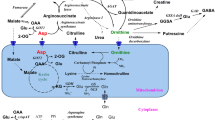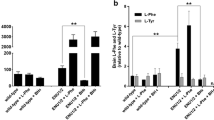Summary
All aspartame does given to humans cause greater elevations in plasma (and, presumably, brain) phenylalanine than in plasma tyrosine. In contrast, doses of aspartame usually used in experiments on rodents preferentially elevate tyrosine. Since phenylalanine can inhibit brain catecholamine synthesis while tyrosine is the antidote for this effect, we determined the aspartame dose that would be needed to elevate phenylalanine more than tyrosine in rodents, using published data. In general rodents need 60 times as much aspartame, on a mg/kg basis, as humans to obtain comparable elevations in phenylalanine with respect to tyrosine.
Similar content being viewed by others
References
Bradstock MK, Serdula MK, Marks JS, Barnard RJ, Crane NT, Remmington PL, Trowbridge FL (1986) Evaluation of reactions to food additives: the aspartame experience. Am J Clin Nutr 43: 464–469
Caballero B, Mahon B, Rohr F, Levy HL, Wurtman RJ (1986) Plasma amino acid levels after single dose aspartame consumption in phenylketonuria. J Pediatr 109: 669–671
Department of Health and Human Services. Quarterly Report on adverse reactions associated with aspartame ingestion. October 1, 1986
Drake ME (1986) Panic attacks and excessive aspartame ingestion. Lancet ii: 631
Garratini S (1986) Aspartame, brain monoamines and neurochemical mediators. International Aspartame Workshop, Nov. 17–21, 1986, Marbella, Spain
Johns D (1986) Migraine provoked by aspartame. N Engl J Med 315: 456
Kiritsy PJ, Maher TJ (1986) Acute effects of aspartame on systolic blood pressure in spontaneously hypertensive rats. J Neural Transm 66: 121–128
Maher TJ, Pinto JMB (1987) Aspartame administration potentiates fluorothyl-induced seizures in mice. J Neurochem 48: S52
Milner JD, Wurtman RJ (1985) Tyrosine availability determines stimulus-evoked dopamine release from rat striatal slices. Neurosci Lett 59: 215–220
Milner JD, Irie K, Wurtman RJ (1986) Effects of phenylalanine on the release of endogenous dopamine from rat striatal slices of endogenous dopamine from rat striatal slices. J Neurochem 47: 1444–1448
Pardridge WM (1986) Potential effects of the dipeptide sweetener aspartame on the brain. In: Wurtman RJ, Wurtman JJ (eds) Nutrition and the brain. Raven Press, New York 7: 199–241
Pinto JMB, Maher TJ (1986) High dose aspartame lowers the seizure threshold to subcutaneous pentylenetetrazole in mice. Pharmacologist 28: 201
Stegink LD, Filer LJ jr, Baker GL, McDonnell JE (1979 a) Effect of aspartame loading upon plasma and erythrocyte amino acid levels in phenylketonuric heterozygotes and normal adult subjects. J Nutr 109: 708–717
Stegink LD, Filer LJ jr, Baker GL (1979 b) Plasma, erythrocyte and human milk levels of free amino acids in lactating women administered aspartame or lactose. J Nutr 109: 2173–2181
Stegink LD, Filer LJ jr, Baker GL, McDonnell JE (1980) Effect of an abuse dose of aspartame upon plasma and erythrocyte levels of amino acids in phenylketonuric heterozygous and normal adults. J Nutr 110: 2216–2224
Stegink LD (1984) Aspartame metabolism in humans: acute dosing studies. In: Stegink LD, Filer LJ (eds) Aspartame: physiology and biochemistry. Marcel Dekker, New York, pp 509–553
Swaiman KF (1969) The effect of phenylalanine and its metabolites on glucose utilization in developing brain. J Neurochem 16: 385–388
Wurtman RJ (1983) Neurochemical changes following high-dose aspartame with dietary carbohydrates. N Engl J Med 309: 429–430
Wurtman RJ (1985) Aspartame: possible effect on seizure susceptibility. Lancet: 1060
Yokogoshi H, Roberts CH, Caballero B, Wurtman RJ (1984) Effects of aspartame and glucose administration on brain and plasma levels of large neutral amino acids and brain 5-hydroxyindoles. Am J Clin Nutr 40: 1–7
Yokogoshi H, Wurtman RJ (1986) Acute effects of oral or parenteral aspartame on catecholamine metabolism in various regions of rat brain. J Nutr 116: 356–364
Author information
Authors and Affiliations
Rights and permissions
About this article
Cite this article
Wurtman, R.J., Maher, T.J. Effects of oral aspartame on plasma phenylalanine in humans and experimental rodents. J. Neural Transmission 70, 169–173 (1987). https://doi.org/10.1007/BF01252517
Received:
Accepted:
Issue Date:
DOI: https://doi.org/10.1007/BF01252517




